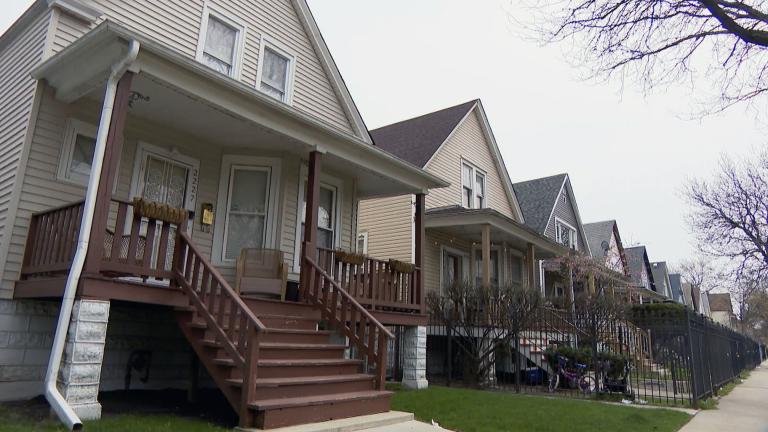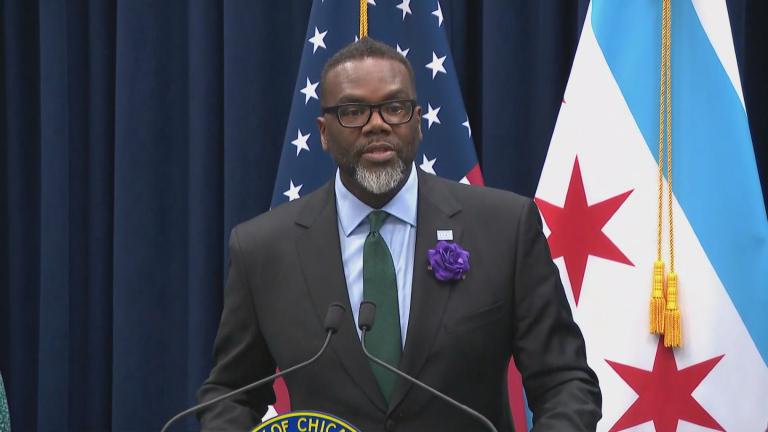Video: WTTW News Explains Chicago’s pension debt and how the city ended up owing $35.4 billion to its four employee pension funds.
The working group formed by Mayor Brandon Johnson in June to tackle Chicago’s acutely underfunded pensions has yet to craft a comprehensive plan to address one of the major fiscal challenges facing the city — but small fixes could be on tap during this month’s veto session, members told WTTW News.
It should come as no surprise that the group of state lawmakers, city officials and union leaders has more work to do to address the city’s “enormous pension shortfall,” which is one of five major fiscal challenges facing Johnson, according to a report from the Civic Federation, a nonpartisan fiscal watchdog group.
Nevertheless, Jason Lee, a senior adviser to Johnson, told WTTW News that the group held “substantive” discussions and “made good progress.”
“I learned a lot,” Lee said, adding that the working group also met with representatives of the Civic Committee, which includes representatives of Chicago’s biggest businesses. “We all got on the same page.”
The group of state lawmakers, city officials and union leaders will continue to meet in an effort to craft a comprehensive plan in time to be presented to lawmakers during their spring session, which begins in January, Lee said.
That means only small pension fixes will be on tap during the veto session that began Tuesday, group members said.
At the top of that list is a measure that would boost the annual cost-of-living increase added to payments made to retired police officers.
Johnson prevailed on lawmakers to delay a vote on the measure pushed by the Fraternal Order of Police, Lodge 7, until he could get his financial team in place and dig into the city’s balance sheets. Before she left office, former Mayor Lori Lightfoot urged lawmakers to reject that proposal, saying it would add $55 million annually to the city’s pension bills.
Police union President John Catanzara agreed to that delay and joined Johnson’s working group, but fully expects the measure to pass during the ongoing veto session.
“We would hope the mayor also puts his support behind the bill and finally wrong that right,” Catanzara told WTTW News. “It’s a funded obligation that our members have been paying into for 50 years plus.”
Gov. J.B. Pritzker signed a similar measure into law in April 2021, ensuring that all retired Chicago firefighters get a 3% annual cost-of-living increase, regardless of whether they were born before or after Jan. 1, 1966.
State Sen. Robert Martwick (D-Chicago), who sponsored both bills, said he planned to introduce a bill during the ongoing veto session ensuring retired police officers get those increases, and he expects it to pass.
“The mayor understands the importance of this fix,” Martwick said. “Not fixing it just perpetuates the problem.”
A more complicated fix that lawmakers could address during the veto session would be to tackle the unanticipated result of a 2010 law that cut the cost of pensions offered to newly hired state and city workers as part of a pension reform plan, known as Tier II.
The cuts included in that law mean that retirement benefits for some workers will begin to fall below the minimum federal standard set by the Social Security Administration, forcing state lawmakers to craft a fix that could be painfully expensive.
A measure to address those issues for retired Chicago firefighters could be introduced during the ongoing veto session, with a comprehensive solution for other retired workers waiting until 2024, officials said.
The working group reached a baseline of agreement on those issues, Lee said.
Even as Chicago’s finances continue to be pinched by soaring pension payments, the city’s pension woes faded from the spotlight after the city climbed the so-called pension ramp in 2022 and complied with a state law that requires two of Chicago’s funds be funded at a 90% level by 2055 and the other two by 2058, ensuring they can pay benefits to employees as they retire.
The city’s four funds are less than 24% funded, according to the city’s 2022 Annual Comprehensive Financial Report. In all, Chicago owes $35.4 billion to its four employee pension funds representing police officers, firefighters, municipal employees and laborers, an increase of 5% from 2021, according to the report.
That law requires Chicago to pay more than $2.41 billion to its pension funds in 2024. Johnson also proposed making an additional payment to the city’s four pension funds of $306.6 million, following a policy put in place by Lightfoot, to prevent “further growth of the city’s unfunded pension liabilities,” according to the mayor’s office.
Martwick praised Johnson for proposing that additional payment, which led in part to one of the major Wall Street ratings agencies upgrading Chicago’s credit rating.
“The advanced payment is a great idea,” Martwick said. “Johnson gets it.”
Contact Heather Cherone: @HeatherCherone | (773) 569-1863 | [email protected]






